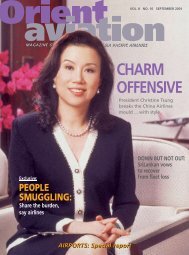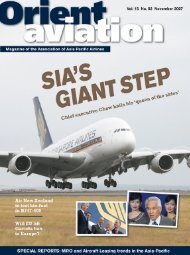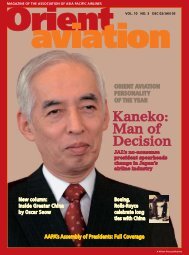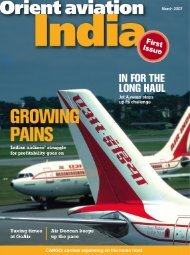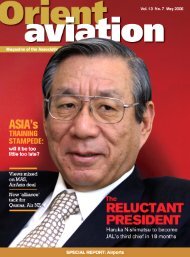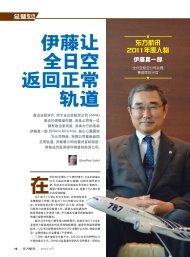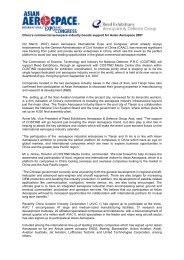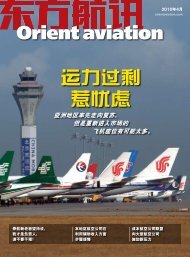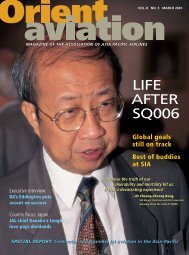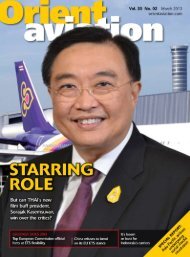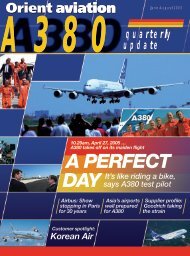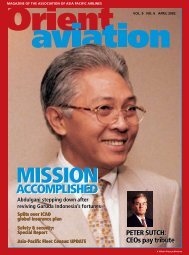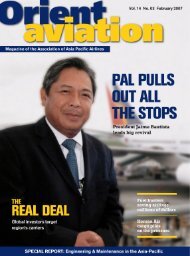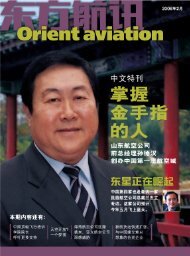a d v e r t o r i a l r e p o r tBusiness Success in Aircraft MaintenanceTotal Customer Care:The Competitive Advantageof SR TechnicsAircraft maintenance work is a complexblend of preventive, scheduledand unscheduled work. More andmore of today’s highly reliable aircraft partsare maintained “on condition”, which meansthere are no fixed time limits for maintenanceactions, but through a careful monitoring ofoperating parameters actions are triggeredwhen needed, before acute failure. In this waythe safe in service times of components andengines are maximised and the maintenancecosts minimised.The true maintenance costs of an operatorare thus not just given by the costs ofits maintenance department plus those ofpurchased services, but have to include alsothe impact of the maintenance on aircraftavailability, of passenger dissatisfaction due totechnical irregularities and other operationalconsequences of the maintenance.To establish an optimised maintenanceconcept requires both an intimate knowledgeof the operational characteristics of an airlineand extensive technical knowledge on thereliability performance of aircraft, engines andsystems. Many satisfied “total care” customersof SR Technics give proof that such an optimisationdoes not require an integrated maintenancedepartment, but can be realised in a wellmanaged customer-supplier relationship witha powerful external service provider.An important success factor in such arelationship is the definition of its optimal,comprehensive scope. As an example, a timeand material contract for engine services givesno incentive to the service provider to activelymonitor the engine performance data, toinduce preventive maintenance actions andto determine the optimal timing of removals– all factors that can significantly influence thetotal engine costs to an operator.For SR Technics “total aircraft care” doesnot mean that all services have to be providedby our staff, from our operations. It meansthat we are supporting the optimisation ofmaintenance procedures across all activities,from line through base to heavy maintenanceand that we support the build up and trainingof adequate support systems and resources– either within a customer’s organisation oras part of our own operation.SR Technics’ “total aircraft care” concept isat the same time the best approach to aircraftsafety as in parallel to the comprehensive costoptimisation the concept also includes themonitoring of all safety aspects of individualmaintenance tasks as well as their total integrationinto a safe, airworthy aircraft.While comprehensive technical supportis one of the most attractive customer valuesSR Technics provides, some features of specificproducts of SR Technics are also uniqueamong the industry: heavy maintenanceSR Technics signed a 15-year powerby-the-hourcontract with Cathay PacificAirways last year to maintain the airline’sCFM56-5C4 engines which power its fleet ofA340-300 aircaft.“SR Technics demonstrated a clear understandingof the powerplant and its overhaulprocess, including the optimum and efficientutilisation of all available resources to supportthis long-term arrangement,” said Cathay’sengineering director, Derek Cridland.In 1996, SR Technics established its regionaloffice in Hong Kong headed by Asia-Pacific executive director Erwin Stillhard.The company has worked with a number ofAsian airlines since the late 1960s. Since thenits customers have included China EasternAirlines, Garuda Indonesia, Japan Airlines,Thai Airways International, China Airlines,Malaysia Airlines, Korean Air, Air China, ChinaNorthern and Biman Bangladesh.February 2000 | <strong>Orient</strong> <strong>Aviation</strong> | 41
visits for DC-10, MD-11, A310 and A330/A340with record fast turn-around times, efficientand fast overhaul services for JT8D, PW4000,CFM56-5 and CFM56-7 engines, componentavailability services and field team assistanceat any location for specific tasks.Ongoing Changesin the MarketplaceA few years ago the marketing and salesof technical services was mostly an affairbetween engineers. Customers were happyto find someone who took care of aircraftand engines and entrusted him to design thesupport as it best suited him. Today operatorsintricately optimise their aircraft utilisationaccording to the needs of their network andclientele. As a consequence they demandhighly customised maintenance, optimallysupporting their operation and businessmission.Despite this need for more and morecustom tailored technical support there is agrowing trend to outsource maintenance. Thistrend is related to the ongoing changes in themaintenance industry. Cost pressures, the ongoingmarket globalisation and technologicaladvances induce a consolidation of the manysmall maintenance organisations across theworld into larger, globally active units withthe necessary size and financial power tooffer modern aircraft support at competitiveprices.In the domain of engine services this consolidationprocess is already well advanced.In this field the airlines have unfortunatelyleft the initiative to the manufacturers. As aconsequence there is now an acute dangerthat the global engine service market willbe dominated by the manufacturers, a monopolisticsituation that is certainly not in theinterest of aircraft operators.In other areas the consolidation processis slowed down by the fact that many of theservice providers are part of a state-ownedand protected airline. There is no questionthat eventually market forces will prevail andwhat is intended to be a protection of themany small and increasingly uneconomicalmaintenance operations will actually workagainst them. Protected from the fast ongoingchanges in the markets, the small operationsmay find themselves stranded between theemerging big, industrially managed and globallyactive market leaders.SR Technics’ Reachesfor Global PresenceSR Technics was fortunate to have itselfprepared just in time for these ongoing changes.As a legally separate business entity, beingon its own, SR Technics had to transmute itsstructures from a functional airline departmentinto a customer and product oriented businessactivity. This entailed the establishment ofproduct oriented cost accounting systems, areview of the product portfolio and the launchof a proper sales and marketing strategy.On the strategic level SR Technics decidedearly on to leverage its capabilities in the globalisationof the industry by taking a lead inthis process. The aim is to set up a network ofstrategically placed operations which providetechnical support in their respective regions,adapted to the needs of the local markets,but always at the quality and performancelevels which constitute the uniqueness of SRTechnics. SR Technics is currently engaged ina series of discussions on partnerships andjoint ventures that will form the basis of ourglobal activities.SR Technics onthe Road to SuccessThe rigorous transformation of theSwissair Technical Services into SR Technics Ltd.has already borne fruit which is reflected in itsbusiness figures: from 1995 to 1998 the salesof services outside the SAirGroup increasedby more than 50%, reaching CHF 525 million,or 48% of the total sales. In the same periodthe maintenance unit costs for the Swissairfleet were reduced by 19% despite more than20% re-evaluation of the US Dollar againstthe Swiss Franc. Productivity and profitabilityKey figures(values in million CHF)1997 1998Revenue 1,060 1,116EBIT 53.5 63Net Profit 26.4 52ROIC 20.1% 225.5%Employees 2,849 3,093could be continuously increased. The assets,consisting among others of all spare parts,rotables and spare engines of the Swissairfleet were successfully managed in supportof the business activities, resulting in anattractive return on investment.The high level of expertise and the businessorientation of SR Technics were also keyfor SR Technics to be selected as an importantpartner by Boeing for its DC-10/MD-10 aircraftconversion programme. SR Technics providesthe total work planning and will moderniseand convert a series of DC-10 aircraft in itsown premises to MD-10s with its advancedtwo men flight deck.Contact Address: SR Technics Ltd.Marketing & Public Relations, TVM8058 Zurich-Airport, SwitzerlandTelephone: + 41 1 812 65 67Telefax: + 41 1 810 69 96E-Mail: srtechnics@sairgroup.comInternet: http://www.srtechnics.comFrom the Swissair Group to SAirGroupThe Swissair Brand is recognised globallyas being a synonym for safety, punctualityand world class service. Swissairhas gained this envious position through along term, systematic cultivation of a spiritof excellence in all activities that are keyto the performance of a first class airline:aircraft operation, inflight product, technicalsupport, ground support, catering, informationservices etc.Recognising that excellence in thesefields has become an important asset inits own right. In 1996, the Swissair Groupchanged its corporate structure. Withinthe Group, renamed to SAirGroup, all theservices now operate as legally independentbusiness units. Their mandate is nomore restricted to serve the Swissair fleet,each activity is expected to develop its ownsuccessful market position within its ownbusiness area and to profit from the globalliberalisation of airline services.Different from other airline groups thatconcentrate their activities to the core of thepassenger transport it is SAirGroup’s explicitstrategy to encourage and support theserelated fields to expand their activities intheir own markets. The example is set by theformer Swissair Catering that has becomethe world’s second largest caterer under thename of Gate Gourmet.SR Technics Ltd was well prepared forthis new challenge. It already had a longstandingtradition to offer its excellent servicesto partners within the KSSU (KLM RoyalDutch Airlines, Scandinavian Airline System(SAS), Swissair and UTA) consortium and toother customers world-wide. SR Technicshas seized the opportunity to build a successfulentrepreneurial activity in its ownright in the evolving market of technicalaircraft services for commercial airliners.42 | <strong>Orient</strong> <strong>Aviation</strong> | February 2000


![OAMag-V7N4-Cover [Converted] - Orient Aviation](https://img.yumpu.com/48598575/16/500x640/oamag-v7n4-cover-converted-orient-aviation.jpg)
